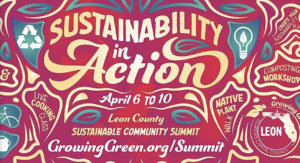
Leon County hosted their 8th Sustainability Summit this week. The theme this year focused on “Sustainability in Action.”
Sustainable Tallahassee hosted a week filled with events featuring Beekeeping 101, Composting 101, a live cooking class, etc. via Zoom. The theme encourages attendees to take the information they have learned and implement it into their daily lives.
Tessa Schreiner has served as the recycling and sustainability manager for over six years for Leon County. Schreiner reinforces the idea that residents can participate in sustainability by making minor adjustments to their everyday routine.
“Sustainability for our community is really important and at first it may seem daunting but small changes you can make in your daily life can make a big difference,” Schreiner said.
The Compost 101 session was hosted by the Leon County Extension Agents and compost experts Molly Jameson and Mark Tancig.
The webinar gave residents key information by explaining the science behind composting, how to start your own compost, and listing household items to use when starting the project.
A compost consists of four key ingredients including water, air, food, and microorganisms. Items added to the soil should be carbon and nutrient elements. Both components can be found in or around your home.
Small branches and twigs, shredded paper waste, cardboard are considered carbon elements. While grass clippings, tea bags, egg shells, vegetable and fruit scraps ingredients promote nitrogen in the soil.
Carbon works as a source of energy which increases the temperature of the compost pile. Nitrogen builds proteins which grow and reproduce in the absorption, according to the Composting 101 webinar.
Mark Tancig is a University of Florida graduate with a bachelor’s degree in botany. Tancig has been a Leon County extension agent for over 5 years. During the webinar he expressed the main reason to compost is to nourish the environment.
“Composting is a very environmentally friendly way to reduce your solid waste,” Tancig said.
Composting is the fifth tier of the Environmental Protection Agency’s Food Recovery hierarchy. The EPA estimates in 2018, 2.6 million tons of food waste was composted.
Americans were able to have a positive influence on the environment by recovering 69 million tons of municipal solid waste through recycling. Municipal solid waste is considered trash or daily items we use and throw away.
Through the Integrated Sustainability Action Plan, Leon County tackles sustainability in eight sectors.
Emissions reduction goals, energy and green buildings, water, waste reduction, transportation, internal protocol, sustainable food systems, and community are the ways the county maneuvers sustainability in the environment.
Leon County gave residents this week the tools they need to have an impact on the environment. With a conscious effort, community members can reduce global warming with household items.